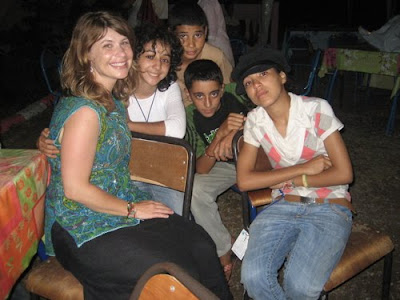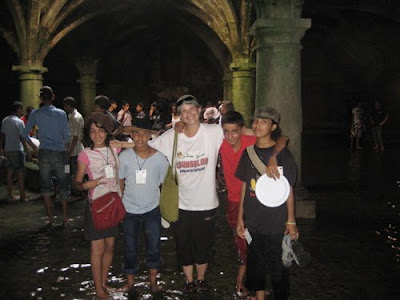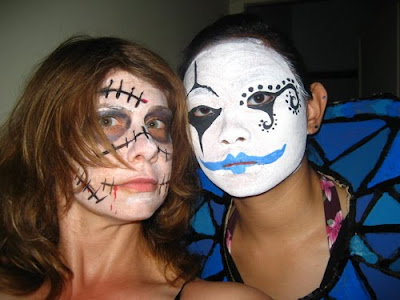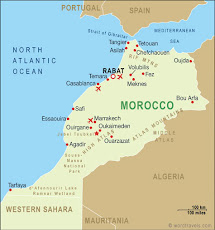It's 4:30 a.m. here, and I'm listening to the muezzin sing the morning's first call to prayer (and, as it's Ramadan, the last chance to eat until sundown this evening). Have to get going in an hour or so to begin my next adventure, but I'm already wide awake.
So, before I take off again for a couple of weeks, might as well finally get around to telling you about the summer camp where I recently spent two weeks with about 80 Moroccan kids and 15 other Peace Corps volunteers.

With the four scholarship kids I brought from my village.
For the past several summers, Peace Corps has worked with the Moroccan Ministry of Youth and Sports to create four two-week English immersion camps in the northern beach town of El Jadida. The U.S. embassy generously funds much of the camp, as well as scholarships for each volunteer to bring four kids from his or her village, at no cost to the students.
To tell you the truth, I was kind of dreading the camp experience. Large groups really aren't my thing ~ especially large groups of teenagers, in any culture, any language. And as it's been so long since I've done any formal teaching, I was kind of afraid I'd lost whatever small ability I'd had.
But you know what? Camp was great ~ one of my best experiences so far. It felt good to be really working again, for one thing. My students were smart, funny and totally into learning English ~ a far cry from my spring camp experience. And the four young kids I brought from my hometown, despite having nearly no English experience, were thrilled to be a part of it all; more than likely a summer camp experience would not have been within their grasp without the scholarship program. Three of my four kids earned "Star of the Day" honors!
I taught advanced English for an hour and a half every morning. With the camp's target age of 13-16, and English not taught in public schools until the second year of middle school, I wasn't even sure what "advanced" would mean. To my surprise, I had 10 nearly fluent teenagers on my hands. Most ~ but not all ~ of them were from the larger cities of Rabat and Casablanca, and from families with the means to give them private schooling and supplementary lessons. But, in another marked difference from spring camp, the rural-urban divide didn't rear its ugly head and all of the kids seemed to get along just fine.
I developed a curriculum based on leadership and teamwork skills, values, communication and other GGLOW (Girls and Guys Leading Our World) concepts, and I was amazed at how enthusiastically my students participated in the discussions and activities, not to mention how easily they could speak ~ extemporaneously! in English! ~ about some fairly advanced concepts.
After class, the students went to the beach. One of my most fulfilling moments was the hour and a half I spent in the water with a young girl named Zenib. It wasn't her first time in the ocean; she obviously knew how to swim. But she spent the first half of the morning clinging to me like a toddler, sometimes with all four limbs wrapped around me, begging me not to let go, afraid to approach her friends, afraid to wade in past her hips. By the time we had to leave, though, it was she who was waving me into the deep end, abandoning me for her friends, waiting for the next big wave to jump into. I was so proud of her.
After lunch, we separated into "country clubs" ~ with volunteers leading activities focused on a variety of countries where English is a dominant language (thus also teaching that English does not automatically equal "American"). Friendship bracelets and chants gave each club an identity as Jamaica, Kenya, New Zealand, Guyana, Canada, India ( ... and, oh dear, I can't remember the other two!). They learned songs, dances, artwork, food, slang and other cultural aspects of their adopted nations, while competing against other clubs for points.
Library/free time and sports rounded out the afternoons, with evenings devoted to a variety of fun activities. A talent show proved Moroccan kids love to be on stage, whether it's rapping, performing skits, singing or displaying such oddities as the ability to walk in a full backbend. The kids really seemed to enjoy Halloween night, but I'm embarrassed to say a bout of claustrophobia forced me to walk out on my job in the haunted house.

The final night's "spectac" show ~ my camera does not do night photos!
The last night was devoted to a very Andy Hardy-like "spectacle" ~ a big show featuring performances by English classes and country clubs. The "spectac" was a source of some frustration in the final days of camp; the Moroccan counselors seemed to view it not as a fun activity for the kids, but as an opportunity to show off for the ministry staff who would be attending. Some of the kids' activities were canceled, including the last beach opportunity, in order to practice, and a sense of anxiety pervaded.
In the end, though, the spectac was truly spectacular. Outdoors on a beautiful evening, before cabaret-style seating, the kids put on quite a show of song, dance and theater. My village student Meriam shone in a duet featuring her as an outspoken housewife. My advanced kids handed out copies of the camp newsletter we'd created in class. Three of them also had a moment of panic when they learned the DJ didn't have the music for the song they'd rehearsed; but in a matter of minutes other volunteers rallied to our cause, and the show did indeed go on. The finale to a fulfilling week.

My village kids and I on a field trip to "the cistern" ~ an ancient gift
to the city from Portugal, which controlled the city from 1502 to 1769.

Halloween night was a big hit with the kids ~ Christa did an amazing job of makeup
on So-Youn, but I didn't really feel like I looked any different from normal.
Now I'm home and already penpals with one of my students, another opportunity to help with her English. (I draw the line, however, at accepting their Facebook requests.) It was 12 exhausting, long days, but I find myself missing my campers and my fellow volunteers. I certainly miss the beachside weather, with its cool breezes off the water. Back in the village it's as hot as ever.
It's also Ramadan, the month in which Muslims fast from sunrise to sundown. A lot of Peace Corps volunteers participate in the fast, or try to. I'm not, though of course I do not eat or drink in public. I've enjoyed participating in lftur, the breaking of the fast, with my host family each evening. Ramadan evenings are a time for celebration, for gathering together for a very traditional meal of harira (a minestrone-like soup, tomato-based, with rice and chickpeas), hard-boiled eggs sprinkled with cumin, dates, fresh juices, and a sticky-sweet pastry called shebekyia. I love harira and could eat it every night year-round. My host sister Kabira, meanwhile, is trying to branch out with pizza and other alternatives.
Ramadan evenings may be celebratory, but the days are long and monotonous. Most people are sleeping or doing as little activity as possible, having little energy during their fasts. The added burden this year of the blistering summer heat (based on the lunar calendar, Ramadan comes 10 days earlier every year) makes this an especially difficult month for Moroccans. There is little opportunity for work; dar chebabs across the country are closed during August, anyway.
And so ... I'm getting out, temporarily, on a long-overdue vacation. Today I start making my way north to Spain, flying out of Marrakech tomorrow morning. I'll spend a few days at a yoga retreat in Andalucia, followed by a few days in Madrid. I won't have my computer with me, and while I may check email once or twice, I'll likely be out of touch for a couple of weeks. I'll let you know when I return.




